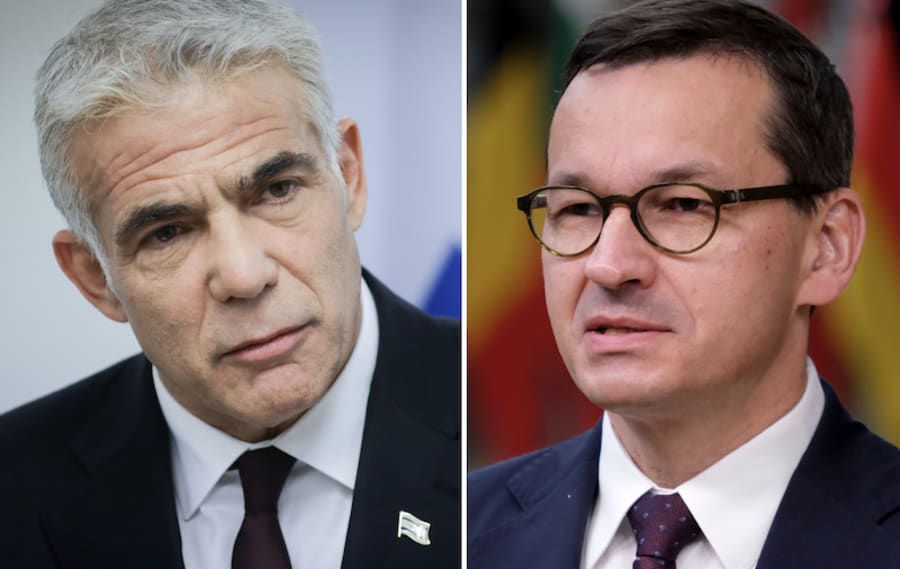Relations between Poland, Israel and Jews worldwide fraying over Holocaust restitution law controversy
Both countries recall their ambassadors after Poland voted to advance a bill that could limit Jewish claims to property stolen during Holocaust

Israel and Poland summoned each other’s respective ambassadors on Sunday as diplomatic tensions rose over the Polish parliament’s decision to advance a controversial Holocaust bill.
The diplomatic crisis has already resulted in heated verbal exchanges between Israeli Foreign Minister Yair Lapid and Polish Prime Minister Mateusz Morawiecki.
What is the controversy about and why does it stir such strong emotions in both Israel and Poland?
Last Thursday, the Polish lower house of parliament passed a legislation – 309 votes in favor, 120 abstentions and zero votes against – that could severely limit Jewish claims to property stolen during Nazi Germany’s occupation of Poland and then kept by the Polish Communist regime after the Second World War.
The controversial bill puts a 30-year deadline for reclaiming stolen property, effectively cutting off any prospects for recovering Jewish property that was stolen over 70 years ago. After passing the lower house of parliament, the bill will also need to be approved by the Polish Senate.
Last Friday, Israeli Foreign Minister Yair Lapid slammed the bill.
“No law will change history. It is a disgrace that will not erase the horrors or the memory of the Holocaust,” Lapid said.
Lapid also called the bill “immoral” and warned that it could seriously undermine diplomatic relations between Poland and Israel. Lapid’s late father, Tommy Lapid, who served as Deputy Prime Minister and Minister of Justice under Ariel Sharon, was deported to a concentration camp during the Holocaust. After the Swedish diplomat Raoul Wallenberg saved him and his mother, Lapid’s father moved to Israel in 1948. Yair Lapid’s great-grandmother was sent to Auschwitz and murdered in the gas chamber.
In an unusually undiplomatic statement, Polish Prime Minister Mateusz Morawiecki added fuel to the diplomatic firestorm between Poland and Israel.
“I can only say that as long as I am the prime minister, Poland will not pay for German crimes: Neither zloty, nor euro, nor dollar,” said Morawiecki.
Lapid blasted the Polish prime minister’s statement by accusing him of peddling the anti-Semitic stereotype of Jews and money.
“The Polish prime minister should again check the facts. Millions of Jews were murdered on Polish ground and no law will erase their memories. We are not interested in Polish money and the very hint is anti-Semitic,” Lapid said.
At the heart of the spat are two proud nations with conflicting narratives over real and perceived victimhood and guilt.
The current Polish nationalist government has for several years been pushing for a narrative that minimizes Polish responsibility for the Holocaust and portrays Poland mainly as a victim of Nazi Germany and Soviet Russia.
Poland did suffer massively during the Nazi occupation and approximately 3 million ethnic Poles were killed during the Second World War. While some Poles saved their Jewish neighbors during the war, many Polish individuals participated in atrocities against the Jewish population.
Speaking to German media in 2019, the Polish prime minister articulated this exaggerated sense of Polish victimhood by lumping together the 3 million murdered Polish Jews with the 3 million ethnic Polish fatalities.
“We have lost 6 million people, many more than any other country that has received vast reparations. It is not fair. It cannot be this way,” Morawiecki said.
Jewish organizations worldwide are also upset and one even called on Jews “to reevaluate our relationship” with Poland.
“This law is a slap in the face to what remains of Polish Jewry and survivors of Nazi brutality everywhere. It also sets a terrible precedent throughout Europe as survivors and descendants continue to seek justice,” said World Jewish Congress President Ronald Lauder whose organization represents Jewish communities in 100 countries. “It pains me to say this, but I think that the time has come for the international Jewish community to reevaluate our relationship with a government that is behaving with unimaginable callousness and is emulating the worst traditions in Polish history rather than the best and most uplifting ones.”
In its efforts to rewrite history, the Polish nationalist government is threatening lawsuits against Holocaust historians like Barbara Engelking and Jan Grabowski whose new book, “Night without End: The Fate of Jews in Selected Counties of Occupied Poland,” documents anti-Jewish Polish perpetrators during the Holocaust.
Unlike most European countries, which have openly or tacitly admitted some responsibility during the Holocaust, the current Polish government sees itself exclusively as a victim and refuses to take any responsibility for anti-Jewish acts committed by ethnic Poles. The Polish government’s default position is therefore to lay all responsibility for any atrocities on either Nazi Germany or Soviet Russia.
However, this narrative does not give a balanced picture of the Jewish property controversy. After the Holocaust, the Polish Communist regime nationalized stolen Jewish property. For the past three decades, Polish governments have systematically refused to return stolen Jewish property, even though the communist era ended in 1989.
While officially blaming the property controversy on Nazism and Communism, the Polish state has simultaneously insisted on keeping stolen Jewish property. While the Nazis and the Communists are long gone, Jewish descendants of Holocaust victims continue fighting for the return of their families’ stolen properties.

The All Israel News Staff is a team of journalists in Israel.













